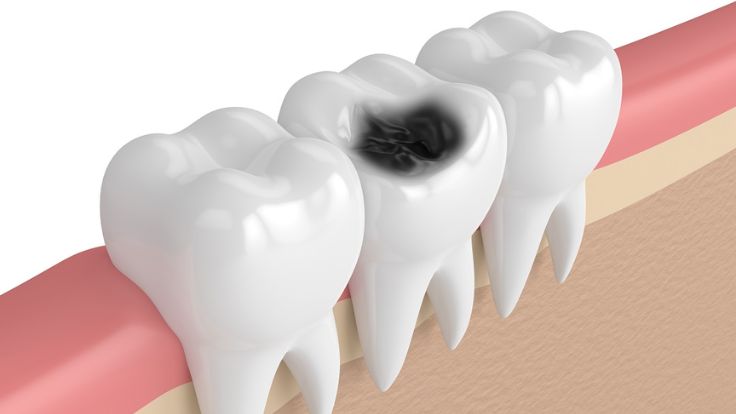
Certain types of food can lead to the development of tooth decay. When these foods linger on your teeth, they increase the acidity in your mouth, contributing to the formation of cavities. Tooth decay is a prevalent dental issue that, if not addressed, can result in pain, discomfort, and potential tooth extraction requirements. Comprehending the causes of tooth decay is crucial to uphold good oral health. This blog outlines the four primary causes of tooth decay and offers prevention tips.
What is Tooth Decay?
Damage to the outer layer of a tooth or enamel is known as tooth decay. This occurs when bacteria in the mouth produce acids that can harm the enamel. Tooth decay can result in cavities (dental caries) and the formation of openings in the teeth, reach the pulp, cause pain, and may even require removal of the entire tooth in extreme cases.
Causes of Tooth Decay
1. Poor Oral Hygiene
One of the leading causes of tooth decay is poor oral hygiene. If you don't brush and floss your teeth regularly, plaque—a sticky film of bacteria—can build up on your teeth. Plaque produces acids that attack the enamel, the hard outer layer of your teeth. Over time, this can lead to cavities.
Prevention Tip: Brush your teeth at least twice a day with fluoride toothpaste and floss daily to remove food particles and plaque from between your teeth.
2. Sugary and Starchy Foods
Eating foods high in sugar and starch can contribute to tooth decay. Bacteria in your mouth feed on sugar and produce acids that can erode your tooth enamel. Sticky and sugary foods like candy, cookies, and soft drinks are especially harmful because they cling to your teeth and fuel bacteria.
Prevention Tip: Limit your sugary and starchy foods intake, and try to brush your teeth or rinse your mouth with water after consuming them.
3. Dry Mouth
Saliva is essential for maintaining oral health because it assists in cleansing the mouth of food particles, counteracting acids created by bacteria, and supplying disease-fighting agents. Insufficient saliva production can result in a dry mouth, raising the likelihood of tooth decay.
Prevention Tip: Stay hydrated by drinking plenty of water, chew sugar-free gum to stimulate saliva production, and talk to your dentist if you experience chronic dry mouth.
4. Frequent Snacking and Sipping
Constant snacking or sipping sugary drinks throughout the day can keep your teeth under constant attack from acids. Each time you eat or drink something sugary, bacteria in your mouth produce acid that can damage your enamel.
Prevention Tip: Try to limit snacking between meals and drink water instead of sugary beverages. If you need a snack, choose healthier options like fruits, vegetables, or nuts.
Treatments for Tooth Decay and Cavities
Treatment for tooth decay and cavities varies depending on the severity of the issue. The extent of the problem determines the choice of treatment.
- Fluoride treatments: If early tooth decay is present, a fluoride treatment can help the enamel self-repair itself and prevent the growth of cavities. It can also be used as a preventive measure.
- Fillings: Typically, to treat cavities, the dentist removes the decayed tooth tissue and then replaces it with a filling material to restore the tooth.
- Root Canal: If the tooth is damaged and infection spreads to the pulp (inside of the tooth), a root canal may be necessary. The decayed pulp will be removed, and the dentist will clean the inside of the tooth and root. The tooth will be temporarily filled, and a permanent filling or crown (a cover on the tooth) will be required in a subsequent visit.
- Extraction (removing the tooth): In the most severe cases, when the pulp damage is irreparable, the dentist may extract the tooth. A bridge or implant may be suggested to replace the missing tooth to prevent the adjacent teeth from shifting and altering the bite.
FAQs
Q1. Can tooth decay be reversed?
Early-stage tooth decay, or enamel erosion, can sometimes be reversed with fluoride treatments and good oral hygiene. However, once a cavity forms, it must be treated by a dentist.
Q2. Are some people more prone to tooth decay?
Yes, factors like genetics, diet, and oral hygiene habits can make some people more susceptible to tooth decay.
Q3. How do I know if I have tooth decay?
Common signs of tooth decay include tooth sensitivity, pain when eating or drinking, visible holes in your teeth, and dark spots on your enamel. Regular dental check-ups can help detect decay early.
Q4. Can tooth decay spread?
Yes, if left untreated, tooth decay can spread to other parts of the tooth and even to surrounding teeth, leading to more serious dental issues.
Final Thoughts
Tooth decay is a common but preventable dental issue. By understanding its causes—poor oral hygiene, sugary and starchy foods, dry mouth, and frequent snacking—you can take proactive steps to protect your teeth. Simple habits like brushing and flossing regularly, making smart food choices, staying hydrated, and visiting your dentist regularly can go a long way in keeping your teeth healthy and your smile bright. Remember, prevention is always better than cure, so take care of your teeth to avoid the pain and complications that come with tooth decay. If you are suffering from tooth decay and looking for a reliable dental clinic for a root canal treatment in Kandiwali, then Smile in Dentistry clinic is here for your help!